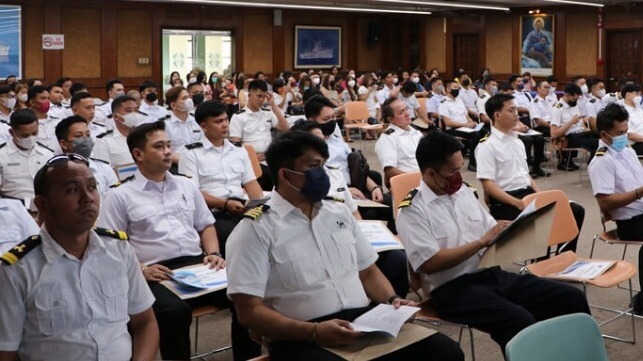The Complexities of a Global Network for Seafarer Medical Exams Post-COVID

The maritime industry operates on a unique foundation where crew health and well-being are critical for safe and effective operations. The COVID-19 pandemic has redefined the requirements for health and safety at sea, leading to new challenges in ensuring that seafarers undergo thorough and consistent preemployment medical exams (PEME) and reemployment medical exams (REME) before embarking on their work deployments. Establishing a comprehensive global network of medical facilities to perform these exams has become a critical task for the maritime sector.
Importance of Standardized Medical Exams for Seafarers
Quality medical exams for seafarers are not just about compliance; they are crucial for the safety of both crew (and in the case of cruise ships – passengers), operational efficiency, and the reputation of maritime companies. Here’s why:
- Operational Safety: Seafarers operate in physically demanding and often high-risk environments. A rigorous PEME ensures that crew members are physically and mentally fit to handle the strenuous nature of their roles and the potential hazards at sea. With conditions such as cardiovascular disease or uncontrolled diabetes posing significant risks in isolated environments, PEMEs and REMEs help mitigate these dangers.
- Legal and Regulatory Compliance: The International Maritime Organization (IMO) and the International Labor Organization (ILO) set stringent medical standards for seafarers. Post-COVID, there’s an increased focus on contagious disease screening, mental health evaluations, and overall fitness for duty. A standardized network of medical facilities helps ensure that exams comply with these regulations, reducing the risk of legal liabilities for shipping companies.
- Pandemic Preparedness: The pandemic highlighted the ease with which communicable diseases can spread in confined environments. Comprehensive medical exams, including detailed health histories and infectious disease screenings, are now essential to prevent onboard outbreaks and safeguard public health.
- Crew Welfare and Retention: Seafarer health is directly tied to job satisfaction and retention. Offering quality medical care, which includes thorough health screenings, promotes crew confidence in the company’s commitment to their well-being, thereby supporting crew retention and morale.
- Mental Health: The pandemic highlighted the psychological challenges of shipboard life and work, especially for crew with pre-existing mental health issues. Screening for mental health issues is difficult and requires providers trained and experienced in proper screening and well aware that this screening is part of the PEME/REME and part of their responsibilities and accountability.
Challenges in Building a Global Medical Network
Creating a worldwide network of high-quality medical facilities for PEME and reemployment exams is a complex undertaking, fraught with logistical, regulatory, and operational challenges:
- Geographical Diversity: Seafarers are recruited globally, from regions as varied as the Philippines, India, Mozambique, Eastern Europe, and Southeast Asia. Establishing a consistent standard of medical exams across countries with differing healthcare systems, resources, and regulations is challenging. There can be significant variations in medical training, facilities, and diagnostic capabilities between locations, leading to inconsistencies in exam quality.
- Regulatory Variability: Different countries and regions have their own medical standards and regulatory frameworks. Aligning these disparate regulations with the uniform standards set by the IMO and ILO requires a nuanced understanding of local laws and ongoing cooperation with regulatory bodies.
- Cost and Resource Allocation: Establishing a global network involves considerable time and research, making sure the culture and quality of the clinics are aligned with the standards of the maritime company. Eliminating clinics found to be capitalizing on the crew, billing for service they do not provide, ordering unnecessary tests to qualify crew, approving crew who should not be cleared, etc., is a constant and difficult responsibility The right providers and clinics need to be selected as they have significant costs in developing and maintaining their facilities as well as ensuring that they are staffed with qualified personnel and equipped with the necessary technology to conduct comprehensive exams. Consolidating and directing business to those clinics felt to be fair, ethical, reliable and of the highest quality in each geographical location is mutually beneficial and I have always attempted to execute this consolidation to quality.
- Logistics and Accessibility: Seafarers often come from remote areas with limited access to specialized medical facilities. Setting up clinics in such regions or arranging for seafarers to travel to larger medical centers, adds a layer of logistical complexity.
- Standardization of Care: Ensuring that all medical facilities follow the same protocols and offer consistent care is a daunting task. This is especially true when it comes to subjective assessments like mental health screenings, where cultural differences may influence diagnosis and reporting.
The Path Forward: Building a Global Network
Developing a comprehensive network of medical facilities for seafarer PEMEs and REMEs requires a multi-faceted approach:
- Partnerships with Global Medical Providers: Collaborating with established global healthcare networks can help ensure consistency and quality across different regions. This approach allows maritime companies to leverage existing infrastructure and expertise while ensuring that local nuances are respected.
- Standardized Training and Protocols: All affiliated medical facilities should follow the same protocols, which include both physical and mental health assessments tailored to the maritime environment. Regular training for healthcare providers on maritime-specific health issues, mental health screening, and cultural competency should be a mandatory component.
- Technology Integration: Digital health platforms can help bridge gaps in care, offering telehealth consultations, digital record-keeping, and standardized reporting across facilities. This ensures that a seafarer’s health history is accessible globally, reducing the risk of oversight or error.
- Focus on Mental Health Support: Maritime companies should go beyond compliance and actively promote mental health support through employee assistance programs, telepsychiatry, and peer support networks. This support should be accessible not just at the time of medical exams but throughout a seafarer’s career.
- Continuous Monitoring and Quality Assurance: Regular audits, feedback mechanisms, and continuous monitoring are essential to maintaining the quality and consistency of care. Establishing a centralized oversight body within the company can help ensure that all facilities adhere to established standards.
AP Companies plays a vital role in supporting maritime clients by providing access to a unique global network of PEME-audited facilities. These facilities are rigorously vetted to meet the highest medical standards, ensuring that seafarers receive consistent, high-quality medical examinations, no matter where they are in the world. Even though the facilities are audited, AP Companies' dedicated medical team goes a step further by thoroughly reviewing all supporting documents. This additional layer of scrutiny ensures the reliability and accuracy of every medical certificate, providing clients with confidence in the quality of care their crew receives.
Conclusion
Post-COVID, the maritime industry’s focus on health and safety has intensified, with PEMEs and REMEs playing a critical role. Building a robust global network of medical facilities to provide these exams is a complex endeavor, but one that is essential for safeguarding the well-being of seafarers and ensuring operational safety. By addressing the logistical, regulatory, and cultural challenges and incorporating comprehensive mental health support, the industry can create a healthier, safer, and more resilient workforce for the future.
AP Companies remains committed to playing an important role in this evolution, ensuring that maritime clients not only access high-quality medical networks but also receive the tailored expertise and ongoing support needed to maintain the health and safety of their crew. With our extensive experience and unique global reach, we continue to lead the way in providing world-class medical assistance services for the maritime industry.
Dr. Arthur L. Diskin is a graduate of the University of Miami School of Medicine with specialty training in Emergency Medicine and an interest in critical care. He is certified by the American Board of Emergency Medicine and is a Fellow of the American College of Emergency Physicians. He has held leadership roles such as the Past President of the Florida College of Emergency Physicians and is the former Chief of the Department of Emergency Medicine at Jackson Memorial Hospital in Miami, Florida, and Mount Sinai Medical Center in Miami Beach, Florida.
This article is sponsored by AP Companies. For more information, visit http://www.ap-companies.com.
The opinions expressed herein are the author's and not necessarily those of The Maritime Executive.
EU to Support Philippines for Seafarer Training and Certification

The Government of the Philippines and the European Union announced the launch of the Technical Assistance Project to improve seafarers' training, education, and working conditions in the Philippines. The effort comes less than two years after EU authorities concerned by the training programs had considered imposing a ban that would have stopped the recognition of seafarer credentials from the Philippines.
Over the next three years, the project will support the improvement of the training, certification, and well-being of Filipino seafarers so they can continue working internationally and under good labor conditions. The European Commission has allocated €4 million (US$4.2 million) as part of the larger EU_ASEAN Sustainable Connectivity Package with a total budget of €60 million (US$63 million) to strengthen ties between the EU and ASEAN.
“The European Commission is delighted to support this significant project, further strengthening the Philippines' education, training, and certification system for seafarers, and demonstrating the solid partnership between the Philippines and the European Union,” said Fotini Ioannidou, Director for Waterborne Transport at the European Commission during a signing ceremony on Monday, November 11. “The project will not only bring mutual benefits to both the Philippines and the EU but also contribute positively to the global shipping industry, recognizing Filipino seafarers as a cornerstone of the maritime workforce worldwide."
The European Maritime Safety Agency (EMSA) had long been citing deficiencies in the training protocols in the Philippines before a 2022 report brought the issue to a head. The Philippines used private training programs for its seafarers, but the report criticized the oversight and inconsistencies in the training. With the support of the shipping community, the Philippine government launched a series of initiatives and the EU agreed in 2023 to continue recognition of the credentials.
“We hope to adopt European standards for our training and certification systems while benchmarking [the] best practices among our ASEAN neighbor countries,” said Jaime J. Bautista, Philippine Department of Transportation Secretary. “A law was recently signed – the Magna Carta of Filipino Seafarers – ensuring the protection and benefits of our highly-skilled mariners. We most welcome the assistance of the European Union in strengthening the education, training, and certification of our seafarers who remain the top choice as crew of the global shipping industry.”
With approximately 1.15 million seafarers, the Philippines is a leading supplier of maritime talent, providing approximately a quarter of the global seafaring workforce. The shipping sector is also a key pillar of the Philippine economy, making substantial contributions to the country’s Gross Domestic Product. In 2022, the industry directly accounted for four percent of the Philippines’ GDP, with seafarers’ remittances adding another 1.7 percent.
The joint training and certification project launched in September and will continue until November 2027.
No comments:
Post a Comment